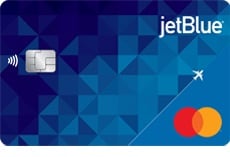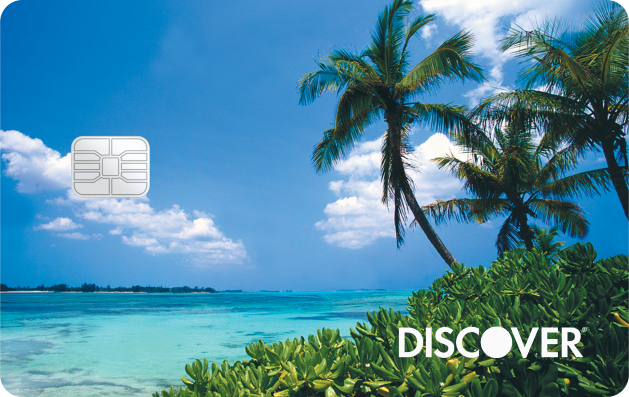JetBlue Card Review: No Annual Fee, but Also Few Key Perks
The Bottom Line
3.5
The card may appeal to infrequent JetBlue travelers who refuse to pay an annual fee. But other cards can offer more long-term value.


Annual fee
$0
Rewards rate
1x-3x
Bonus offer
Earn 10,000 bonus points after spending $1,000 on purchases in the first 90 days.
Intro APR
0% intro APR on Balance Transfers for 12 billing cycles
Ongoing APR
APR: 21.24%-29.99%, Variable APR
Cash Advance APR: 29.99%, Variable
Balance transfer fee
Either $5 or 5% of the amount of each transfer, whichever is greater.
Foreign transaction fee
0% of each transaction in U.S. dollars.
- Earn 10,000 bonus points after spending $1,000 on purchases in the first 90 days
- Earn 3X points on eligible JetBlue purchases, 2X points at restaurants and eligible grocery stores and 1X points on all other purchases
- Points awarded in your TrueBlue account don't expire
- 50% inflight savings on cocktails and food purchases
- No foreign transaction fees on international purchases
Pros and Cons
Pros
High rewards rate in certain categories
Intro APR period
No annual fee and no foreign transaction fees
Discounts on select in-flight purchases
Cons
Low rewards rate on most spending
No travel credits
No redemption bonus (unlike other JetBlue cards)
No anniversary bonus (unlike other JetBlue cards)
Detailed Review
The JetBlue Card has potential for loyal JetBlue customers who may be true to TrueBlue — the airline's frequent flyer program — but who aren't interested in paying an annual fee. But it lacks the benefits of other airline cards, like free checked bags and a large enough sign-up bonus to cover the cost of a round-trip flight.
Still, the JetBlue Card, issued by Barclays, earns elevated rewards both on JetBlue purchases and in some everyday spending categories. It also offers deep discounts on in-flight purchases. If your main priority is a no-fee airline card and you’re a frequent JetBlue flyer, this card could be a good fit. But if you’re willing to pay a fee in exchange for more premium perks, you have other options.
This card's big sibling is the JetBlue Plus Card. It features more generous rewards, but also an annual fee of $99. For more information about how these two JetBlue cards differ, read our head-to-head comparison.
JetBlue Card: Basics
Card type: Airline.
Annual fee: $0.
Sign-up bonus: Earn 10,000 bonus points after spending $1,000 on purchases in the first 90 days.
Rewards:
Earn 3 TrueBlue points for every $1 spent on purchases made directly with JetBlue Airways.
Earn 2 TrueBlue points for every $1 spent on restaurant and grocery store purchases.
Earn 1 TrueBlue point for every $1 spent on all other purchases.
You can redeem points for flights on JetBlue or on a JetBlue partner, including Hawaiian Airlines and Qatar Airways. You can also redeem for vacation packages through JetBlue Vacations or transfer your points to another TrueBlue member’s account. Otherwise, you can donate points to charity.
NerdWallet values JetBlue points at 1.5 cents each. This is a baseline value, drawn from real-world data on hundreds of economy routes, not a maximized value. In other words, you should aim for award redemptions that offer 1.5 cents or more in value from your JetBlue points.
APR: 0% introductory APR on Balance Transfers for 12 billing cycles, then an ongoing APR of 21.24%-29.99%, Variable APR.
Balance transfer fee: 5% (minimum $5).
Foreign transaction fee: None.
Other benefits: Save 50% when you use the JetBlue Card on eligible inflight purchases.
Compare to Other Cards
Benefits and Perks
Earning points is easy
This card offers elevated rewards on more than just purchases directly with the airline. Buying food will get you closer to a free flight as well because the card earns double points at grocery stores and restaurants.
Redeeming points is easy, too
You won't be limited by blackout dates when booking award travel on JetBlue. Once you earn enough points, all you need to do is log in to your TrueBlue account and choose the option to search for flights based on points rather than dollars. You can also redeem TrueBlue points with JetBlue partners.
Save on in-flight purchases
A bag of pretzels may not be enough on a long flight. The JetBlue Card gives cardholders 50% off all in-flight food and cocktail purchases when they use their card to pay. So go ahead: Get the wine and the cheese platter.
Get a bonus with no annual fee
The JetBlue Card not only has an annual fee of $0, but it also offers a sign-up bonus: Earn 10,000 bonus points after spending $1,000 on purchases in the first 90 days.
Drawbacks and Considerations
No free checked bags
One big advantage that many co-branded airline cards offer is a checked-bag-fee waiver. You won't get that valuable key perk with the JetBlue Card. Be prepared to pay at least $35 to check your first bag if you selected the Blue Basic, Blue or Blue Extra fare, and at least $50 to check a second bag on Blue Basic, Blue, Blue Extra and Blue Plus fares (passengers flying on the airline's Mint premium travel service and those who have attained Mosaic status, get two free checked bags). If you fly frequently with JetBlue, consider the JetBlue Plus Card, which does offer a free checked bag for you and up to three travel companions booked on the same reservation. The card's annual fee is $99. But if you and a companion took only one round-trip Blue fare flight per year and you each checked one bag, you would otherwise pay $140 total.
Tied to JetBlue Program
Compared with the JetBlue Card, a general travel rewards card like the Discover it® Miles offers a lot more flexibility. It earns 1.5 miles per $1 spent on all purchases, you can redeem for a statement credit to pay for flights, hotels, cruises, rental cars and more.
Underwhelming sign-up bonus
The JetBlue Card's sign-up bonus is modest and not enough to cover most routes that JetBlue flies. If you're willing to pay the $99 annual fee, the JetBlue Plus Card offers a much more generous sign-up bonus. Or if you're adamantly opposed to any kind of annual fee, you could again consider a general travel card like the Discover it® Miles. Its annual fee is $0, and it offers a nifty sign-up promotion: "UNLIMITED BONUS: Unlimited Mile-for-Mile match for all new cardmembers—only from Discover. Discover gives you an unlimited match of all the Miles you’ve earned at the end of your first year. You could turn 35,000 Miles to 70,000 Miles. There’s no signing up, no minimum spending or maximum rewards. Just a Miles-for-Miles match."
Or browse NerdWallet's roundup of the best credit cards to get for a look at other options.
How To Decide If It's Right For You
This card could work for infrequent travelers who fly mostly with JetBlue but are adamantly opposed to paying an annual fee. But the lack of free checked bags is a big drawback, and other cards can provide greater long-term value.
With no annual fee, this card gives you 1.5 miles for every $1 you spend. It comes with a new-cardmember bonus offer, and points are redeemable for statement credit against many kinds of travel expenses — flights on any airline, stays at any hotel and so on.
Looking For Something Else?
Methodology
NerdWallet reviews credit cards with an eye toward both the quantitative and qualitative features of a card. Quantitative features are those that boil down to dollars and cents, such as fees, interest rates, rewards (including earning rates and redemption values) and the cash value of benefits and perks. Qualitative factors are those that affect how easy or difficult it is for a typical cardholder to get good value from the card. They include such things as the ease of application, simplicity of the rewards structure, the likelihood of using certain features, and whether a card is well-suited to everyday use or is best reserved for specific purchases. Our star ratings serve as a general gauge of how each card compares with others in its class, but star ratings are intended to be just one consideration when a consumer is choosing a credit card. Learn how NerdWallet rates credit cards.



